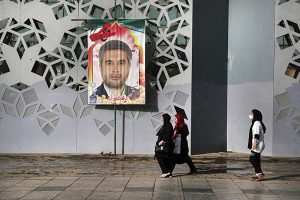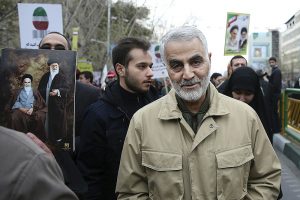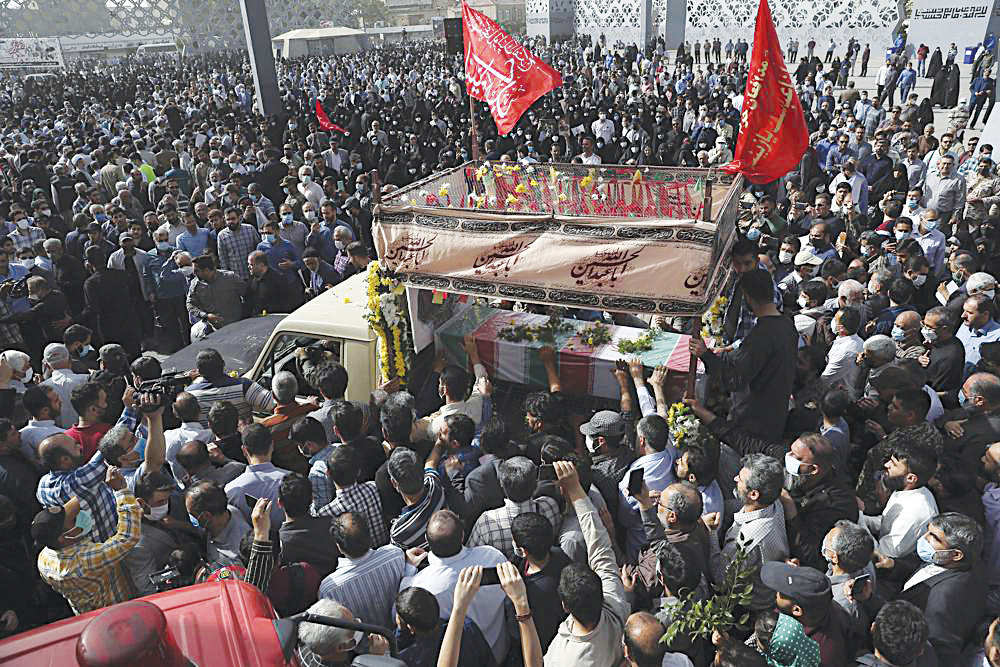Edited by: TJVNews.com
Iranian President Ebrahim Raisi said Monday that revenge is “inevitable” for the Sunday assassination of a senior Islamic Revolutionary Guards Corps (IRGC) leader in Tehran, as was reported by World Israel News.
“I insist on the serious pursuit of the perpetrators of this crime by security officials, and I have no doubt that revenge for the blood of this great martyr is inevitable,” Raisi said about the shooting death of Col. Hassan Sayyad Khodaei, according to the state-affiliated Mehr news agency.
WIN reported that after motorcyclists armed with silenced weapons ambushed Khodaei in his car outside his home in the Iranian capital, the IRGC blamed “the criminal terrorist act” on “the counter-revolution and ele-ments related to the global arrogance.” This terminology is their standard code for the United States and Is-rael.

Raisi repeated the claim in his statement, saying, “There is no doubt that the hand of global arrogance can be seen in this crime.”
No one has claimed responsibility for the assassination, whose method is similar to those employed in the elimination of certain Iranian nuclear scientists in the country and abroad over the last two decades, accord-ing to the WIN report.
The AP reported that the two assailants shot Col. Hassan Sayyad Khodaei five times in his unarmored Iranian-made Kia Pride, state media said, right off a highly secure street home to Iran’s parliament.
Reports identified Khodaei only as a “defender of the shrine,” a reference to Iranians who fight against the extremist Islamic State group in Syria and Iraq within the Guard’s elite Quds force that oversees foreign oper-ations, as was reported by the AP.
Little information was publicly available about Khodaei in the immediate hours after the assassination as Quds officers tend to be shadowy figures carrying out secretive military missions supporting Hezbollah, the Leba-nese militant group, and other militias in Syria, Iraq and elsewhere, according to the AP report.
It was the first major assassination in Iran since the head of its secret nuclear program, Mohsen Fakhrizadeh, was eliminated in a remotely controlled ambush in November 2020.
Iran has blamed Israel and vowed revenge after all the targeted killings, according to the WIN report.
WIN also reported that Khodaei was the mastermind behind plots to murder Jews and Israelis around the world, according to the Hebrew language press.
Channel 12 News in Israel reported that Khodaei was the planner of a foiled attack to murder five Israelis in Cyprus.
WIN reported that he was also the driving force behind a recently thwarted attempt to lure prominent Israe-lis, including former security officials, academics and businesspeople, in order to facilitate their kidnapping.
Due to the similarity with other assassinations on Iranian soil, particularly of its nuclear scientists, many specu-late that Israel and the Mossad security agency are responsible for the shooting, as was reported by WIN.
“I demand the serious pursuit [of the assassins] by security officials, and I have no doubt that the blood of this great martyr will be avenged,” Iranian president Ebrahim Raisi said in a press statement on Monday morning.
“There is no doubt that the hand of global arrogance can be seen in this crime,” he added. The term “global arrogance” typically refers to Western powers, including the United States, and its allies, such as Israel.
“This is not the first time that assassination has taken place in Tehran,” Abas Aslani, a Tehran-based analyst at the Center for Middle East Strategic Studies, told Al Jazeera.
“There have been examples in the past. And most of the time the Israelis and Americans have been at fault.”

The Tehran prosecutor arrived at the crime scene within hours of the killing to investigate and demanded police urgently arrest the perpetrators. The AP reported that the probe’s speed suggested Khodaei’s promi-nence in the murky structure of the Guard’s overseas operations.
Those operations have come under repeated Israeli air attack in Syria. The AP reported that an Israeli strike near the Syrian capital of Damascus killed two Guard members in March, prompting Iran to retaliate by firing a missile barrage into northern Iraq.
Security forces were pursuing the suspected assailants, state TV reported, without offering further details or giving a motive for the killing, according to the AP report.
Around the same time, state-run media said the Revolutionary Guard’s security forces had uncovered and arrested members of an Israeli intelligence network operating in the country, without elaborating on wheth-er they had any connection to Khodaei’s slaying.
The report indicated that according to the IRGC, Khodaei served in Syria, where Israel has been actively dis-couraging the entrenchment of an inimical Iranian presence through thousands of airstrikes at military targets and weapons shipments in recent years. Israel calls its actions the “war between the wars.”
Walla News reported that the senior commander in the Quds Force, in charge of all foreign operations of the IRGC, planned attacks on Israeli targets in Africa and South America. Channel 12 in Israel quoted unspecified reports that Khodaei was second in command of the Force’s Unit 840, whose area of expertise is devising terror operations against both Israelis and Jews around the world, according to the IDF, according to the WIN report.
Brig. Gen. (Res.) Yossi Kuperwasser, former head of the IDF’s Research Division and a senior researcher at the Jerusalem Center for Public and State Affairs, said Sunday that the assassination in broad daylight was “another blow to the prestige of the extremist Islamic regime that exposes its penetrability and inability to protect its people.”
Khodaei’s funeral was held on Monday afternoon in Tehran.
A Jewish News Syndicate report by Yaakov Lappin indicated that Iran’s Islamic Revolutionary Guards Corps’ (IRGC) Navy also maintains a covert presence in the Red Sea through an array of ships, including some that gather intelligence and act as forward bases, a top defense researcher has said.
Lt. Col. (ret.) Michael Segall, a senior analyst at the Jerusalem Center for Public Affairs, told JNS that after an alleged Israeli attack on the Saviz ship – described by international media as an IRGC ship acting as a forward and expeditionary base ship – the Iranians replaced it with a new ship, the Shahid Roudaki– a conversion of merchant ship into military floating base-, which is also operated by the IRGC, and is located off the Eritrean coastline.
“The Shahid Roudaki and other forward base ship are usually equipped with fast boats that can be lowered to the sea with cranes,” said Segall, as was reported by JNS.
“Usually, the Islamic Republic of Iran Navy (IRIN) is active in missions/deployment outside of the Persian Gulf, while the IRGC-N is responsible for the Persian Gulf and Iran’s littoral shores. But they also cooperate, such as when IRGC forward naval bases may cooperate with Iran Navy ships in international waters,” he added, ac-cording to the JNS report.
While the IRGC usually deploys forward base ships to act as intelligence-gatherers and enable rapid attack capabilities, the Iranian Navy, which is less well funded than its IRGC equivalent, unveiled last year its own forward base, in the form of a large ship called the IRIS Markan, a converted tanker, able to act as a mother-ship for naval operations, such as escorting Iranian tankers.
“The Markan is a huge ship that accompanies smaller vessels,” said Segall.
On Thursday, Reuters reported that a vessel was attacked 63 kilometers (34 nautical miles) off the Yemenite coastline, adding that an investigation was underway.
British maritime security company Ambrey Intelligence said the incident involved a sailing vessel that man-aged to escape an attempted boarding from occupants of skiffs and that the crew have been reported safe, the report stated, according to JNS.
The incident is a reminder of Iran’s ongoing harassment and attack of international shipping, including oil tankers.
On July 30 and July 31, 2021, the IRGC sent suicide unmanned aerial vehicles to attack the Mercer Street tanker off the coast of Oman, killing two personnel on board, as was reported by JNS.

JNS also reported that in addition to Iran’s naval activities around the Middle East and beyond, Iran is con-stantly upgrading its asymmetrical sea tactics and exporting these to its proxies and partners, like Hezbollah in Lebanon, Hamas in Gaza and the Houthis in Yemen.
“We have seen Iranian tactics over and over again in Yemen, which has become Iran’s biggest combat lab,” said Segall.
“The crux of this doctrine is the use of fast boats laden with bombs. Some are manned and some are un-manned, using GPS guidance systems. These have attacked Saudi offshore targets,” he noted.
The use of anti-ship cruise missiles—as Hezbollah did against Israel in a deadly attack in the 2006 Second Leb-anon War—is also evolving as an attack capability, he stated.
“They are building sea-based abilities to launch UAVs, and this is something that can reach our area, too,” cautioned Segall, as was reported by JNS.
The use of small submarines for laying mines is another Iranian aspect of this doctrine, as is using the many islands around the Persian Gulf to hide small attack vessels.
The Israeli Navy is preparing for these things, too,” said Segall, adding that it is safe to believe that Israel is closely monitoring events in Yemen to learn more about Iranian thinking about combat at sea.
“The clear and present danger is to Israel’s offshore gas rigs. Israel has built a multi-layered defense around these,” said Segall, according to the JNS report. “In Yemen, Iran is learning about how to use UAVs, ballistic missiles, cruise missiles and fast-attack boats.”
Also on Tuesday, Politico reported that President Biden has finalized his decision to keep Iran’s Islamic Revo-lutionary Guard Corps on a terrorist blacklist, according to a senior Western official. This further complicates international efforts to restore the 2015 Iran nuclear deal.
Politico also reported that another person familiar with the matter said Biden conveyed his decision during an April 24 phone call with Israeli Prime Minister Naftali Bennett, adding that the decision was relayed as abso-lutely final and that the window for Iranian concessions had closed.
Subsequent to their conversation, Bennett said in a statement: “I am sure that President Biden, who is a true friend of Israel and cares about its security, will not allow the IRGC to be removed from the list of terrorist organizations.” The White House’s readout said the two leaders spoke about “the threat posed by Iran and its proxies.”
A spokesperson for the National Security Council said, “We do not comment on private diplomatic discus-sions,” according to the Politico report. Rob Malley, Biden’s special envoy for the Iran talks, is due to testify before U.S. lawmakers on Wednesday about the status of the negotiations, as was reported by Politico.
The Jerusalem Post reported that Bennett and other Israeli leaders have been publicly voicing their strong opposition to delisting the IRGC for the past six weeks, along with top Emirati and Bahraini officials.
According to State Department Principal Deputy Spokesperson Jalina Porter, Biden shares the view that members of the Islamic Revolutionary Guard Corps Quds Force are terrorists and had no plans to remove them from the FTO list, as was reported by the JPost.
The United States placed the IRGC on its “Foreign Terrorist Organizations” list in 2019, according to the Politico report. The designation was part of the “maximum pressure” campaign then-President Trump imposed on Iran after pulling the United States out of the nuclear deal, which had restricted Iran’s nuclear activity in ex-change for sanctions relief.
Politico also reported that Iranian officials want the United States to lift the terror label before Tehran returns to compliance with the nuclear deal. But the United States has refused to do so, unless Iran offers some se-curity-related concessions beyond the nuclear agreement.
Speaking to Politico last month, a US official familiar with the matter said: “The U.S. position has been that unless Iran agrees to take certain steps to assuage security concerns beyond the JCPOA, Washington will not lift the terror designation, which itself is beyond the JCPOA.” THE JCPOA is an acronym for the deal’s official name: the Joint Comprehensive Plan of Action that was crafted by the Obama administration.
The official made clear the administration’s position wasn’t going to change, “especially given ongoing threats by the IRGC against Americans,” according to the Politico report.
(Sources: World Israel News, Associated Press, The Jerusalem Post, Jewish News Syndicate, Al Jazeera, Reu-ters, Walla News, Politico)




